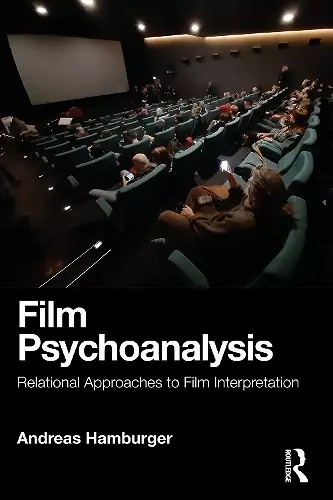Film Psychoanalysis
Relational Approaches to Film Interpretation
Format:Paperback
Publisher:Taylor & Francis Ltd
Published:27th May '24
Currently unavailable, and unfortunately no date known when it will be back
This paperback is available in another edition too:
- Hardback£140.00(9780367424305)

Through the development of psychoanalytically informed film interpretation, Andreas Hamburger provides new insights into the experience of watching films and their influence upon our internal lives.
Building upon a relational understanding of psychoanalysis, this volume develops a methodical procedure for psychoanalytical film interpretation, discusses individual aspects of the medium – such as editing, spatial and temporal design – and puts approaches to film psychoanalysis and cinema theory into a systematic perspective. Hamburger exemplifies his arguments in a detailed analysis of numerous film examples and demonstrates how an in-depth encounter with the medium can provoke new and surprising understandings.
Providing an interdisciplinary perspective that crosses the study of popular culture with psychoanalytic theory, this book will be required reading not only for students and scholars of film, but also for psychoanalysts in practice and training.
'This illuminating book is groundbreaking for a contemporary psychoanalytical interpretation of art, because the author consistently advocates an experience-led approach to film analysis. He takes the viewer's self-experience and his or her inner transformation as the starting point for approaching the unconscious content of the film. But only the fit with the material found in the film can confirm the unconscious, interactive scene between the viewer and the film. This convincingly avoids short-circuits of a cognitive external perspective or a simplistic equation of film and dream.'
Heribert Blass, MD, training analyst, German Psychoanalytic Association, EPF president, IPA president-elect
'Andreas Hamburger's landmark book is a rare and refreshing attempt to find an appropriate and contemporary approach to re-evaluate the relation of psychoanalysis and film studies. Starting off with the classical ideas of psychoanalytical film theory, Hamburger focuses on the cinematographic form and opens the field of discussion along concepts of the image, desire, seduction, and scenic understanding. A complex interdisciplinary book recommended for scholars and students of film and psychoanalysis alike.'
Prof. Dr Marcus Stiglegger, film studies, University of Mainz, Germany
'In his capitaving book, Andreas Hamburger embarks on a thought-provoking exploration of the human psyche and its complex relationship with film. With a compelling narrative style, the author expertly guides readers through an introspective journey, challenging conventional notions and prompting us to re-evaluate our understanding of this art form. Drawing from a wide range of disciplines, including psychology, philosophy, and pop culture, the book deftly weaves together diverse perspectives to shed light on the multifaceted nature of the art of film making. The author skillfully demonstrates how our encounters with callous, lonely, and evil figures in literature, film, and real life can serve as catalysts for self-reflection and emotional growth.'
Ilany Kogan, training and supervising analyst, Israel Psychoanalytic Society; Elise M. Hayman Award for the Study of the Holocaust and Genocide (2005); Sigourney Award for life-time work (2016)
'This is an essential book for any aspiring film psychoanalyst. Drawing on thirty years of studying psychoanalytic responses to art forms, Andreas Hamburger generously takes the reader on a journey of exploration of the joint history and relationship between psychoanalysis and the cinema, vividly illustrated by the discussion of a huge diversity of films. His development and use of a thoughtful and robust method of film analysis, always centred on reflections upon the "experiencing subject in his body," is the central principle, or "fil rouge," of this masterful work.'
Dr Anne Patterson, fellow of the British Psychoanalytical Society, co-director of the European Psychoanalytic Film Festival and editor of the New Library of Psychoanalysis book series
'Film Psychoanalysis invites us to view those stories enfolded within a silver grain of light as our personal events. An invitation to "suffer living" and experience the unconscious moving forms stirred by the film. This new relational analytic approach shows that these stories change us, as we "enter analysis with the films" while analyzing them. Film Psychoanalysis is an exciting exchange between cinema and psychoanalysis and valuable reading for transdisciplinary and relational researchers engaged in psychoanalytic, cultural, and psycho-social work.'
Dr Anatol Reghintovschi, psychoanalyst and filmmaker, Romania
'Andreas Hamburger takes his readers through a scholarly firework of sophisticated considerations on the structural, dynamic, technical aspects and, crucially, the meaning of film: of an array of individual works, analysed with careful attention to detail, and of cinema itself as an art form. Film-psychoanalysts are portrayed as active subjects: absorbed by what they watch on the screen while also self-reflecting (as they would in their consulting room with patients) on their own emotional responses to it. Such oscillations of focus, from the screen out-there to the mind in-here, will provide, Hamburger suggests, the richest opportunity of understanding the complex intercourse between psychoanalysis and cinema. If you love either, or both, this is essential reading.'
Andrea Sabbadini, fellow, British Psychoanalytical Society; founder and former director, European Psychoanalytic Film Festival; author, Moving Images: Psychoanalytic Reflections on Film (2015)
'Andreas Hamburger's book gives an overview of international and German approaches to film psychoanalysis and presents the author's own method of spectatorship analysis. Hamburger advises analytically oriented viewers to use their own emotional, cognitive, and bodily resposnes to understand the film's impact on their unconscious. Thus, the researcher is enabled to examine not only the plot, the characters and the cinematic tools, but also the impact of the film on us as viewers.'
Svetlozar Vassilev, chair of the IPA film and psychoanalysis group and training and supervising psychoanalyst of the Bulgarian psychoanalytic Society
ISBN: 9780367424299
Dimensions: unknown
Weight: 453g
258 pages